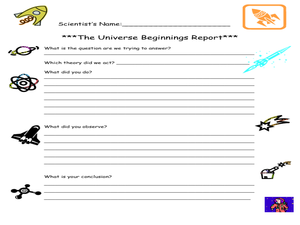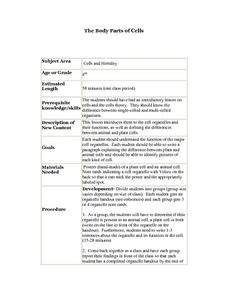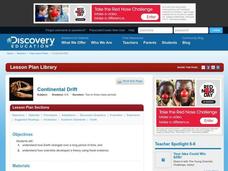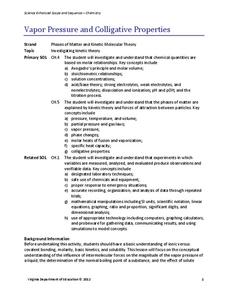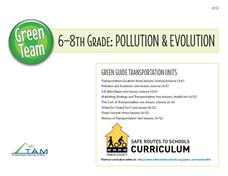Curated OER
Populations – The Survival of the Fittest (Part 1)
Students explain in their own words why organisms live together. In this biology lesson plan, students model what happens to organisms if their environment changes. They explain the importance of evolution.
Virginia Department of Education
Thermochemistry: Heat and Chemical Changes
What makes particles attract? Here, learners engage in multiple activities that fully describe colligative properties and allow the ability to critically assess the importance of these properties in daily life. Young chemists...
ReadWriteThink
Critical Media Literacy: Commercial Advertising
Commercial advertising—we can't get away from it, but do we realize just how often we are being advertised to? With this instructional activity, scholars analyze mass media to identify how its techniques influence our daily lives....
Curated OER
Dinosaurs 1: Where are the Dinosaurs?
Students study dinosaurs and explore the concept of extinction. In this dinosaur lesson students create dinosaur eggs and view dinosaur dioramas.
Curated OER
Range, Cluster, Gap and Outliers
There are a number of activities here where learners collect and record data, as well as, activities where the likelihood of an event happening is calculated given the experimental probability. Young statisticians organize information...
Roald Dahl
The Twits - The Twits Get the Shrinks
Turn readers into investigative journalists. The 11th and final lesson that accompanies The Twits by Roald Dahl asks the question "What happened to Mr. and Mrs. Twit?" The lesson uses mind maps and group discussion to help answer...
Curated OER
Space: The Universe As We Know It!
Students simulate the Big Bang. In this lesson on the origin of our universe, students role play to show how the Big Bang explosion may have created our universe.
Curated OER
The Body Part of Cells
Eighth graders are introduced to cell organelles and their functions and the they define the differences between animal and plant cells. They write a paragraph explaining the difference between plant and animal cells and students...
Curated OER
The Photoelectric Effect in Photocells
Illuminate your physics class with this examination of a photovoltaic cell. Teach the structure and operation of the device using a diagram. Then make a human-powered, larger-than-life sized model of a PV cell. Learners become electrons...
Curated OER
Moral Development in Camus' The Stranger
“In the depth of winter, I finally learned that within me there lay an invincible summer.” Readers of The Stranger rate Mersault’s moral development (or lack thereof) using Kohlberg’s Theory of Moral Development scale. Using...
Saint Louis Zoo
Introduction to Natural Selection: Darwin & Lamarck
Charles Darwin and Jean Baptiste Lamarck are credited for developing the theory of natural selection. After teaching your beginning biologists about acquired characteristics, they read the included selection and answer questions that...
Curated OER
Continental Drift
Be sure to come prepared to discuss the theory of Pangaea and the two super-continents, Laurasia and Gondwanaland. Collaborative learners look for fossil evidence that supports the theory that one super-continent divided into two. They...
Colorado State University
What Is a "Model"?
Model the transfer of energy during a typical 24-hour period. Young scholars use a game-like approach to learning the patterns of heat transfer through the day and night. Groups of four exchange different tokens as the energy...
Virginia Department of Education
Molecular Model Building
During this hands-on activity, young chemists build molecular models based on the Lewis dot structure before studying valence shell electron pair repulsion theory.
Virginia Department of Education
Vapor Pressure and Colligative Properties
Hate to vacuum, but enjoy using a vacuum pump? Explore a lesson plan that starts with a demonstration of boiling water at various temperatures by using a vacuum pump. Then scholars design their own experiments to measure vapor pressure...
Curated OER
Bling Bling Metallic Mosaics
Using different types of paper and paint, young artists will create a beautiful mosaic. This is a great variation from the traditional tile and grout mosaics. Use this beautiful art project to discuss different art mediums,...
NASA
Century Timeline
Scholars use the Cosmic Times and the Internet to create a timeline of events from 1916 when Einstein presented the Theory of General Relativity to 2016. Scientific discoveries are the main focus, then pupils add in events from culture,...
Society for Science & the Public
Easter Islanders Made Tools, Not War
When studying artifacts, especially tools, how do archaeologists determine what the devices were used for? In what ways might researchers' previous experiences influence their perception of an artifact? An article about researchers'...
Safe Routes to School
Pollution & Evolution
Bring together a study of two major scientific topics with a lesson on the relationship between pollution and evolution. With the help of a PowerPoint presentation, hands-on activity. and class demonstration young scientists learn...
Curated OER
True Spin: Music
Upper graders take a critical look at art criticism, music, and politics. They watch one segment of "True Spin," produced by VH1 music television and then discuss myths that relate to art and music. Several modern songs are analyzed...
Curated OER
Children's Playthings And Books
High schoolers categorize studenT toys by intelligence types. They review toy safety and function and identify the appropriate play age of various toys. They read and evaluate studenT books and write one of their own.
Curated OER
Reflection of Light
Students experiment with reflections of two plane mirrors placed at a 90 degree angle to see what will be reflected.
Roy Rosenzweig Center for History and New Media
Slaves and Indentured Servants
In theory, at least, indentured servitude and slavery were two different practices in the American colonies. Class groups conduct a close reading of two primary source documents, one written by a slave and one by an indentured servant,...
Curated OER
Geo Jammin' By Design - Day 7, Lesson 38: Kool Cups
Create geometric cups by interpreting directions, informational text, and mathematical concepts. Critical thinkers apply geometric theory (congruent shapes, patterns, symmetry) to actual directions to create a cup that holds Kool Aid....








